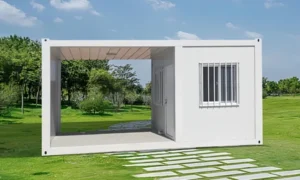Building plans for container homes require a clear understanding of necessary permits and regulations. From zoning laws to building codes, knowing what’s required helps ensure a smooth construction process and prevents costly delays.
Navigating the Permit Process for Your Container Home
- Zoning Permit:
- This permit ensures your container home project complies with local zoning laws. Some areas confine container homes to certain zones, while others impose restrictions on their size, height and their purpose.
- Building Permit:
- Required for almost all construction projects, this permit ensures that your container home is compliant with the safety structural requirements, building codes, and other regulations. Usually you have to present developed architectural plans, engineering reports, and other documentation.
- Foundation Permit:
- Based on your design, a seperate foundation permit may be required. Container homes almost always require some level of stable foundation that involves concrete piers, slabs, and other support structures. Permits can be an entire minefield of seemingly straight forward documents, that when neglected can cause a lot of trouble down the line.
- Plumbing, Electrical, and Mechanical Permits:
- If your container home includes plumbing, electrical wiring, heating, or ventilation systems, individual permits are usually required. Licensed professionals often handle these installations to comply with safety codes.
- Septic System Permit (if applicable):
- If you’re building in a rural area without access to municipal sewage systems, you might need a permit to install a septic system.
- Environmental Permits:
- Depending on the location, you may need environmental permits, especially if your project could affect local ecosystems or involves land grading and tree removal.
- Occupancy Permit:
- Once construction is complete, an inspection is typically required to ensure everything is up to code. Upon passing, you’ll receive an occupancy permit, allowing you to legally live in your container home.
Tips for Navigating the Process
- Research Local Codes: Regulations can vary widely, so visit your local building department or website for specific guidelines.
- Work with Professionals: Hiring architects, engineers, or contractors experienced with container homes can streamline the process and ensure compliance.
- Prepare Thorough Documentation: Be ready to provide detailed plans, structural reports, and other necessary paperwork.
- Communicate with Inspectors: Building relationships with local inspectors can help you understand requirements and avoid surprises during inspections.
By understanding and securing the right permits, you’ll ensure a smoother building process while avoiding costly delays or fines. With proper planning, your container home can become a legal, safe, and beautiful living space.
Interested in starting your container home journey? Visit our platform at carteroom.com and contact us for a free quote today!
Get in Touch:
- Alibaba International Site: Carter House on Alibaba
- WhatsApp: +86-13081655379
- Email: admin@carteroom.com



